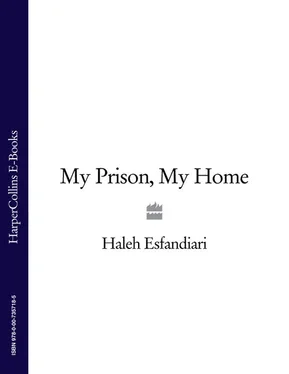My Prison, My Home
Haleh Esfandiari
One Woman’s Story of Captivity in Iran

To Mutti, Haleh, Hayedeh, and Shaul
Freedom is when you forget the spelling of the tyrant’s name and your mouth’s saliva is sweeter than Persian pie, and though your brain is wrung tight as the horn of a ram nothing drops from your pale-blue eyes.
—JOSEPH BRODSKY, “A PART OF SPEECH”
Cover Page
Title Page My Prison, My Home Haleh Esfandiari One Woman’s Story of Captivity in Iran
Dedication To Mutti, Haleh, Hayedeh, and Shaul
Epigraph Freedom is when you forget the spelling of the tyrant’s name and your mouth’s saliva is sweeter than Persian pie, and though your brain is wrung tight as the horn of a ram nothing drops from your pale-blue eyes. —JOSEPH BRODSKY, “A PART OF SPEECH”
1. The “Robbery”
2. An Iranian Childhood
3. A Career Interrupted
4. The Interrogation
5. “Things Will Get Worse”
6. The Lull
7. The Arrest
8. Evin Prison
9. The Release
10. Freedom
Epilogue
Acknowledgments
ALSO BY HALEH ESFANDIARI
Copyright
About the Publisher
THE EARLY HOURS OF DECEMBER 30, 2006, began for me like any day when I would depart Tehran for the United States. I had come back to Iran, as I did two or three times a year, to visit my ninety-three-year-old mother. The doorbell rang at one a.m. It was Mr. Modarress, the taxi driver I used whenever I was in Iran, to take me to the airport. My mother held up a Quran for me to kiss and walk under for blessing and good luck; from a jug, she poured water on the hallway floor outside the apartment, as is customary in Iran to ensure a voyager a safe, prosperous journey.
Mother had stopped coming to visit us in the States after suffering a stroke two years earlier, although she could manage the shorter trip to Vienna, where my sister, Hayedeh, lived. Hayedeh came to Tehran once a year, on my mother’s birthday. I came more often, and always made it a point to spend Christmas with Mother in Tehran, returning to Washington, D.C., to be with my family for New Year’s Day. On this night, Mother and I sat up together, waiting for the driver. We talked about my childhood in Tehran; as well as my daughter, Haleh; my grandchildren, Ariana and Karenna, ages six and four; and my husband, Shaul. Mother was very fond of her grandchildren and great-grandchildren. I always saved these stories for the last few hours, to keep her mind away from my leaving.
Mother—“Mutti” as we called her in the German tradition—had come to Iran as a twenty-three-year-old bride in the late 1930s. She had met and fallen in love with my father while at the University of Vienna, where he was studying for his doctorate in botany. In more than fifty-five years of marriage, she had never fallen out of love. When my father died in 1995, she chose to remain in Iran, wishing to be buried next to him.
On this night, Mutti was on edge. “If you were only in Austria already!” she said. “I will feel better when you call me from Vienna Airport.” I tried to sound upbeat. “I will see you in three months,” I replied. I never prolonged our good-byes. They were too difficult for her. I kissed her face one last time, smoothed her gray hair, and walked down the stairs.
As I got into Mr. Modarress’s beat-up Peykan, the most common passenger car in Iran, I saw my mother looking down at me and waving from an upstairs window. She had removed her shawl, and I could see the beige cashmere sweater I had given her. Her last words to the driver had been “Call me when Khanum Doktor [Madame Doctor] is gone.” Ever since I had received my Ph.D. in 1964, my proud mother always referred to me as “Frau Doktor” when she spoke of me to Europeans, and “Khanum Doktor” when she spoke to Iranians.
It was a cold, clear Tehran night. The haze from factory smokestacks and car exhaust pipes that shrouds the city by day had dissipated. The street was quiet. No one else was out—not even at the revolutionary magistrate’s court at the end of the street, where I often saw people escorted in wearing handcuffs. My mother’s street was usually packed with parked cars and shoppers by eight a.m. Residents blocked their small driveways with huge flowerpots to stop non-residents from stealing their parking spaces. Only when evening fell did Street No. 18 revert back to its residents.
I checked again that I had my passport, plane ticket, and other documents, and settled into the backseat, only mildly apprehensive, as I always was when leaving Iran. Under President Ahmadinejad, who had been elected a little over a year before, the security services had cracked down on writers and academics. We all knew of newspaper closures and arrests. The well-known intellectual and political philosopher Ramin Jahanbegloo had been arrested at the airport on his way to Europe, and spent four months at Evin Prison, where he was coerced into saying he had unknowingly acted against the interests of state security. But Jahanbegloo was interested in politically charged ideas, such as democratic transitions. My work as the director of the Middle East Program at the Woodrow Wilson Center in Washington, D.C., on the other hand, merely involved organizing talks and conferences on Middle Eastern issues, and hardly merited the attention of the Iranian authorities.
In the car, Modarress was not his usual talkative self. He drove in silence. He was also going slowly. Usually, he acted like everyone else in Tehran’s frantic, everything-goes traffic, weaving in and out of the lanes as if he were on a racetrack. Now he seemed preoccupied—with monetary or family problems, I assumed. He is getting old, I thought. He doesn’t like driving at night anymore. The day before, he had made all sorts of excuses not to drive me to the airport. His mother-in-law was sick, he said; he might have to go to the provinces, to Tabriz. But my mother insisted. “You are the only driver I trust to take Khanum Doktor to the airport,” she told him and in the end he came.
We were almost at the exit ramp to Yadegar-e Imam Highway, the road that would take us to the airport, when I first noticed the dark green Peugeot sedan that had pulled alongside us. The driver was motioning for us to stop. When we didn’t, the Peugeot began to force us off the road. I had called my mother earlier to wish her good night; we had hung up, but I was still holding the cell phone in my hand, unsure what was happening, thinking that perhaps we had a flat tire. I had barely made out the Peugeot’s four occupants before our car was pushed onto the shoulder, blocked off by the Peugeot, its doors inches away from the hood of our car.
Three men, large knives strapped to their hips, jumped out of the car. They all seemed to be wearing identical, olive drab outfits. One, a tall, burly man with a crude Persian accent, ordered Modarress to switch off the motor, open the trunk, and hand him the car keys. Even in the dark, I could make out an ugly, pockmarked, unshaven face. He took my suitcase. Another disheveled man snatched my carry-on bag from the front passenger seat. The third got into the backseat beside me. In the semidarkness he looked sinister. Slivers of light glinted on his rimless eyeglasses and bald head. Astonishingly, he was grinning as he examined the contents of my handbag. “Take everything, but leave my passport and plane ticket,” I managed to say. “I am traveling tonight.”
Читать дальше













